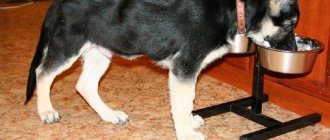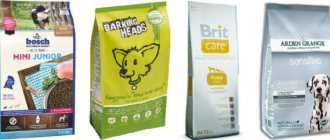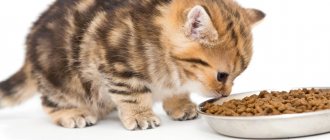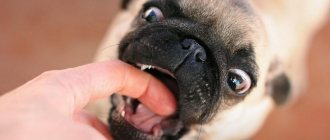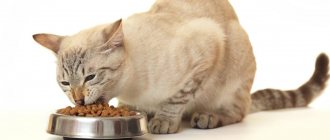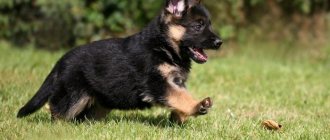In order for a tiny puppy to grow into a strong and healthy German Shepherd, it is important to properly organize its nutrition.
When preparing a diet, it is worth considering that the puppy has a small stomach and a fast metabolism, so it is recommended to feed it often and in small doses. You will also learn what to feed your puppy correctly at 1, 2, 3-4 and later months.
How to feed?
- For the first 14 days, the puppy is fully cared for by his mother, and he receives all the necessary nutrients and vitamins from her milk.
- Next, the breeder needs to gradually introduce complementary foods. At the same time, it is important to maintain a balance of nutrients so that the puppy does not develop hypovitaminosis.
- At 30 days of age, the puppy’s diet consists of 30-40% of bitch’s milk, and 60-70% of ready-made food.
First food
At two weeks of age, and if necessary earlier, complementary feeding begins using the following products:
- Low fat cottage cheese.
- Meat scraper.
- Special mixtures for complementary feeding.
Special mixtures for feeding newborn puppies are similar in composition to bitch's milk , so their correct use does not cause the risk of hypovitaminosis. Natural food is difficult to balance, so it is extremely important to monitor the puppy’s condition so as not to miss the onset of rickets or eczema.
After introducing complementary foods, puppies have a natural need for water, so there should always be a shallow bowl of water next to their house. If puppies cannot drink water on their own, then it is poured into their mouths using a pipette before each feeding. Boiled water is used.
Straight
When feeding Nauralka, it is recommended to introduce each new product gradually, and it is extremely important to monitor the reaction of the puppy’s body. If constipation occurs, the puppy is given a tummy massage and given dill water.
In case of loose stools, puppies are given rice water . If the stool does not return to normal within 24 hours, it is recommended to consult a veterinarian, since diarrhea can be a sign not only of indigestion, but also of a disease such as colibacillosis.
The product that caused digestive upset is excluded from the diet or given in a different form (boiled, steamed, mixed with other products).
From about 25-27 days, puppies are accustomed to porridge made from ground rice and buckwheat . A little later, grated vegetables and fish are introduced into the diet.
Which food is better?
High-quality food is the key to healthy development of a puppy. It is not recommended to buy economy or premium food, as they usually contain a lot of cheap, low-quality fillers. Dry food should be intended for feeding large breed puppies from a very early age. Almost every well-known manufacturer has such food in their assortment.
It is worth paying special attention to the composition of the feed: it should not contain corn or its processed products , and there should also be no vague formulations, for example, meat, vegetables, fat, etc. Ideally, both the type of meat and its percentage will be indicated (for example, dehydrated lamb meat - 17%, etc.).
You should not buy food in bulk, since pet store sellers often violate the rules and shelf life.
From what month can you be dry?
You can give dry food to puppies from two weeks of age . Before feeding, it must be soaked with water at room temperature or milk. It is recommended to give dry food to puppies over 1.5 months old.
When can a puppy be given complementary foods?
Two weeks after birth, you can start feeding the puppies. During this period, they are still breastfed, but for full development, the babies’ bodies need new nutrients. At 14 days they can be given minced lean beef, finely chopped and scalded tripe or heart, rice porridge with milk mixed with water in a 1:1 ratio. At three weeks the German is fed cottage cheese, yogurt and kefir. At four weeks, hard-boiled eggs are added to the diet. Vegetables, berries and fruits are given in small quantities.
For the first time, complementary feeding should be 15-20 g, which corresponds to half a tablespoon. In the future, the rate of any food fed per day should gradually increase:
- at 2.5 weeks – 100 ml;
- at 3 weeks – 150 ml;
- at 4 weeks – 200 ml.
Diet by month
When using ready-made dry food, there are no difficulties with the diet: all recommendations for feeding and portion sizes are indicated on the packaging. But those who prefer to feed German Shepherd puppies natural food usually have many questions. Below you will find out what you can feed one month old, two month old and older puppies.
- At the age of 1 month, the puppy is fed 6 times a day. 30% of the diet should consist of meat (lean beef), and the rest should be dairy products and plant foods. From dairy products, it is recommended to give cottage cheese, kefir or yogurt. Vegetables – grated stewed carrots or zucchini. You can give one-month-old puppies chopped lettuce and spinach. It is recommended to cook porridge from ground buckwheat or rice. Give a boiled egg yolk or quail egg once a week.
- At the age of 2 months, puppies already become more developed and eat well on their own, so meat and vegetables can be cut into small pieces rather than grated. Gradually, you can introduce boneless boiled sea fish, chicken, apples and pears into your diet. It is recommended to start cooking porridge from whole grains. It is important to remember to provide dairy products daily.
- At the age of 3-4 months, the puppy is fed the same foods with the addition of various offal: beef heart, liver, kidneys, udder, tripe, chicken stomachs, etc. Doses of offal should be small, and it is recommended to give them no more than 1-2 times a week.
- For cheeks at the age of 5-6 months, the number of feedings is reduced to 3 times. The same products are used, but you can diversify the diet with bananas, bell peppers, tomatoes and cucumbers, a small amount of cheese, berries (strawberries, blueberries, plums) and steamed oat bran.
- Puppies over 6 months old are fed 2 times a day. The same products are used.
For clarity, below is a table of the diet of a German Shepherd puppy by month.
| Puppy age, months. | Number of feedings | Recommended Products |
| 1 | 6 | Beef, cottage cheese, kefir, curdled milk, carrots, zucchini, lettuce, spinach, boiled egg yolk. |
| 2 | 5-6 | Beef, chicken, fish, cottage cheese, kefir, yogurt, carrots, zucchini, apples, lettuce, spinach, boiled egg yolk. |
| 3-4 | 4-5 | Beef, chicken, fish, offal, cottage cheese, kefir, curdled milk, carrots, zucchini, apples, lettuce, spinach, boiled egg yolk. |
| 5-6 | 4-3 | Beef, chicken, fish, offal, cottage cheese, kefir, curdled milk, carrots, zucchini, apples, pears, bananas, strawberries, blueberries, plums, lettuce, spinach, boiled egg yolk, oat bran. |
| Over 6 | 2 | Beef, chicken, fish, offal, cottage cheese, kefir, curdled milk, carrots, zucchini, apples, pears, bananas, strawberries, blueberries, plums, lettuce, spinach, boiled egg yolk, oat bran, oat bran. |
List of prohibited products
A common mistake many owners make is giving their pet leftover food from their table, and subsequently wondering why the dog suffers from problems with the digestive system. A homemade diet is not suitable for feeding animals, as it is too high in calories and contains a lot of spices, salt and sugar.
Feeding from a common table is strictly prohibited
You should absolutely not give your shepherd:
- fatty meats (pork, lamb);
- chicken, pork and fish bones;
- pasta;
- potato;
- all types of sausages, including frankfurters;
- sweet and non-sweet pastries;
- legumes (peas, lentils, beans);
- smoked, fried or dried meat;
- flour dishes (bread, dumplings, pies);
- chocolate and candies;
- mushrooms;
- raw river fish;
- salted and pickled vegetables;
- canned meat, fish and vegetables;
- semolina, millet and pearl barley porridge;
- citrus;
- nuts and seeds;
- raw milk;
- dishes containing herbs and spices.
Important: you should not flavor your pet’s porridge with vegetable or animal fat remaining after frying meat and vegetables, as it is extremely harmful to the liver of animals.
The owner must approach feeding German Shepherds responsibly and carefully. After all, the development and health of dogs depend on the quality of products and a properly formulated diet, and in this matter one cannot be careless, believing that homemade food or leftovers from your own table are suitable for your pets.
Up to a year
From birth until the age of one year, the puppy actively grows. Therefore, it is extremely important to follow the recommended diet so that the German Shepherd grows up healthy and strong, with a beautiful breed exterior.
Basic principles of feeding a puppy up to one year old:
- Maintaining a balance of all nutrients.
- Maintain intervals between feedings according to age.
- Monitor portion sizes: the puppy should not overeat, but starvation will have an adverse effect on its growth and development.
- Food should be at room temperature.
- Fractional meals.
Up to 6 months, it is recommended to give German Shepherds food in the following proportions::
- 10% of the entire daily allowance - dairy products;
- 10% - vegetables;
- 10-20% – vegetables and cereals;
- everything else is meat and meat by-products.
Recipes for a German Shepherd Puppy
To prepare a main dish for a German Shepherd, you can use a recipe that includes the following ingredients:
- bone with meat – 500 g;
- beef by-products – 150-300 g;
- rice – ½ cup;
- buckwheat – ½ cup;
- carrots – 1 pc.;
- tomato – 1 pc.;
- zucchini – 100 g.
Preparation procedure:
- Boil broth on bones and meat.
- Chop the vegetables and mix with a blender.
- Finely chop offal.
- Remove the bone, add vegetables, offal and grains to the broth.
- Cook until done.
The recipe can be modified by adding other vegetables, cereals and seaweed.
After a year
When the shepherd reaches the age of 1 year, the number of feedings is reduced to 1-2 times a day. You can use either dry food for dogs over 1 year old, or the natural food that the shepherd ate as a puppy.
At the age of 6 years and older, a dog is considered elderly ; physiological changes begin to occur in its body. For example, metabolism slows down and physical activity decreases. Therefore, the dog requires a special low-calorie, low-protein diet.
Emergency assistance in case of poisoning
If food poisoning is suspected, a starvation diet and sorbents that bind and remove the toxic substance from the body are recommended. This may be one of the following pharmaceutical drugs:
- polysorb,
- atoxyl;
- enetrosgel;
- white coal;
- Activated carbon.
To relieve spasms and vomiting, 2-3 ml of no-shpa (drotaverine) is injected intramuscularly, and after 30 minutes - 2 ml of cerucal (metoclopramide). Instead of water, the poison of medicinal herbs (chamomile, yarrow, oak bark) is drunk in fractions. For intestinal upset, use one of the following antibiotics:
- nifuroxazide;
- metronidazole;
- biseptol,
- chloramphenicol.
If the condition worsens and is accompanied by an increase in body temperature, the dog should be urgently taken to a veterinary clinic.
Views: 5,994
Daily norm
The daily amount of dry food is indicated on the packaging. If the dog eats natural food, then the daily norm is calculated as a percentage of its weight:
- 6-7% under 6 months of age;
- 3-4% over 6 months of age.
Since among German shepherds there are both active representatives of the breed and couch bumpers, it is necessary to focus, first of all, on the appearance of the dog :
- if her ribs are sticking out, then you should increase the portion;
- If she quickly gains fat, it is recommended to give her less food.
Pet training
Training is also very important for a shepherd dog, especially for a growing one. At the age of three months, you can already actively teach your pet commands, educate and instill correct behavior. Training must be carried out regularly so that the dog gets used to constant mental work. The shepherd should also be exposed to physical exercise and play. You can, of course, give your dog up to an experienced dog handler. He will quickly train the dog and teach him to obey his owner.
In conclusion, I would like to say that any pet requires attention and control from the owner, no matter how many months or years he is. Of course, it is important to monitor its development, pay attention to developmental deviations in a timely manner, care for and love your pet with all your heart. Then he will grow up and turn into a true family protector and devoted friend.
Why doesn't he eat well?
There are many factors that influence loss of appetite:
- Changing teeth.
- The dog ate grass or pieces of stick bark on the street.
- The dog is too spoiled with treats.
- Picky eating is inherited.
- Heat.
- The presence of any disease.
Attention! If, in addition to loss of appetite, there is decreased activity, drowsiness, restless behavior, diarrhea or vomiting, the puppy should be taken to the vet immediately.
Is it possible to give bones and what kind?
It is recommended that German Shepherd puppies be given bones as they help sharpen and clean their teeth and also massage their gums.
But not all bones can be given to a puppy. Sharp tubular bones, which a dog can easily chew, can damage the larynx, esophagus and stomach with their fragments. Therefore, it is strictly prohibited to feed dogs chicken and rabbit bones .
Dogs can be given:
- Tubular bones of beef or lamb.
- Beef moslaki or large joints.
It is not advisable to give boiled bones , since heat treatment changes the structure of the bone tissue, and as a result they are poorly digested.
Dog character
Despite the beginning of maturation, the puppy still remains a mischievous child by nature.
He plays pranks with pleasure and prefers to play rather than listen to his owner and be trained . This is the time when you need to be persistent and show the puppy that he must obey his owner.
Things in the apartment - furniture or shoes - can suffer from the dog's behavior. Therefore, it is important to walk the dog as much as possible in special areas where the puppy can throw out all the hyperactivity.
This behavior is explained by post-vaccination quarantine . Once it comes to an end, it will be easier to deal with the dog.
Three months is the right time to teach your dog to react to passers-by, guests and other dogs. This will help build the dog's balance.
But you shouldn’t take her to places where there are a lot of loud and frightening sounds - the puppy’s psyche has not yet fully formed, such an environment can contribute to the dog becoming nervous and fearful.
How to give gelatin?
To strengthen cartilage and prevent the development of joint diseases, many experienced German Shepherd breeders recommend giving puppies gelatin daily. Most often, ordinary food gelatin is bought for these purposes and soaked in water, or a tablespoon of powder is poured directly into the porridge.
In pet stores you can find special vitamins with gelatin, for example, Kanvit (calcium + gelatin) or Gelacan Baby (collagen hydrolysate). But they should be given strictly in accordance with the instructions. It is advisable to first consult a veterinarian.
What vegetables are allowed?
Not everything that is beneficial to humans provides similar benefits to dogs. For example, some vegetables can cause severe digestive upset in your German Shepherd puppy .
- Recommended vegetables for feeding dogs include: carrots, pumpkin, zucchini, bell peppers, cucumbers, sweet potatoes, asparagus, turnips and radishes.
- It is strictly forbidden to give dogs potatoes, broccoli, legumes, eggplant, garlic and rutabaga.
- Give tomatoes, cabbage (only stewed), and beets with caution.
Healthy cereals
- One of the healthiest cereals is buckwheat. It has a positive effect on the dog's metabolism. It also contains leucine, which is an excellent preventive measure for liver disease. But it is recommended to give buckwheat porridge with caution, as it can cause allergies in some dogs.
- Rice stimulates digestion and is perfectly absorbed by the body. It is often prescribed for poisoning, allergies and diseases of the digestive system.
- Many German Shepherd owners cook oatmeal for their pets.
However, oatmeal or flakes can cause an eating disorder, and in sedentary dogs, obesity. It is recommended to give oatmeal only in combination with buckwheat or rice.
The life and health of a German Shepherd puppy directly depends on its owner. Failure to follow nutritional recommendations for puppies, feeding low-quality cheap food, and eating prohibited foods for your dog can lead to the development of various diseases.
Feeding rules
A German Shepherd's diet should be appropriate for its age, weight, and level of physical activity. To ensure that food is well absorbed, experienced dog handlers advise following some recommendations.
- Feed your dog at the same time every day. The body gets used to receiving food at certain hours, which has a positive effect on digestion. An adult German Shepherd should be fed twice a day.
- Food should be at room temperature – neither cold nor hot.
- Feeding duration is about 20 minutes. After this time, the bowl is removed, even if the pet has not licked it clean.
- Do not feed the animal if it has to move a lot, to avoid intestinal or stomach volvulus.
- Fresh water should always be freely available.
Using this calculator, you can find out the daily food intake depending on the condition, activity level and weight of your pet. Read more.
It is better to feed your German Shepherd on a stand. Then the bowl will not “crawl” into the corner, and it will be more convenient for the animal to eat.
Important. If you feed an adult dog incorrectly, it can cause gastrointestinal upset and the development of various diseases.

